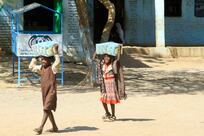ISTANBUL // Just a few minutes' drive from the park where Istanbul's protests have set up camp, people in Recep Tayyip Erdogan's childhood neighbourhood do not mince words.
The protesters, residents of Kasimpasa grumble, are a bunch of godless "hippies" occupying public property. They still see the Turkish prime minister as a national hero.
It is clear how these protests, which started when police tried to dispersed a sit-in by environmentalists on May 31, have divided Turkey. On one side are the demonstrators and their supporters, who number in the hundreds of thousands in cities across Turkey and want the government to be more responsive to minority views. On the other side, Mr Erdogan and his supporters insist that the government has a democratic mandate for a conservative agenda.
A kilometre uphill from Kasimpasa, the demonstrators have built a tent camp paradise in Gezi Park in the past 10 days, with people handing out books and free food. On a recent sunny morning, Suha Yilmaz, 30, was having breakfast in front of his tent in the park, which has been occupied by hundreds of members of the protest movement like himself for more than a week.
The food he ate was donated by supporters and distributed by activists. News reports quoting food industry sources say orders for deliveries of pizza, burgers and water to Gezi Park are coming in from all over Turkey and even from abroad. Also nearby, "Gezi Park Library" was giving out donated books. And just outside the park, a Turkish hard-rock version of the Internationale anthem was blaring from a booth of a leftist group.
Mr Yilmaz said demonstrators were united in their opposition to Mr Erdogan, whom they accuse of authoritarian tendencies and an unwillingness to listen to parts of society that do not support his policies.
"It is like a slap in the face for him," Mr Yilmaz said about the wave of protests. "It's telling him: know your limits."
Mr Erdogan represents conservative Turks who say planned restrictions of the sale of alcohol and other steps are part of a normalisation process after the excesses of a strictly secularist system marginalised more observant Muslims for decades.
But Mr Yilmaz accused the prime minister of dividing the country by trying to force the values of his own religiously conservative voter base onto the whole country and alienating parts of society. "He always talks about 'us' and 'you', about 'the others'," Mr Yilmaz said.
According to a poll taken last week and published by T24, an internet news portal, 64.1 per cent of Turkish voters oppose the government development project for Gezi Park that triggered the protests, but 61 per cent of voters of Mr Erdogan's ruling Justice and Development Party (AKP) are in favour.
The opposition leader Kemal Kilicdaroglu has warned of a "dangerous polarisation" in Turkish society. "A man who polarises society isn't any good for the country," he said of Mr Erdogan last week.
But that is not how people in Kasimpasa see it. As a teenager, Mr Erdogan sold snacks on the streets of the neighbourhood, which has the reputation of being one of Istanbul's rougher districts. Political opponents sometimes call the prime minister "Kasimpasali", or man from Kasimpasa, because of his tough rhetoric.
Sitting outside a tea house near the 16th-century Camiikebir Mosque in Kasimpasa, Kemal Varici, a 68-year-old pensioner, said he did not think the demonstrators enjoyed support among the wider population.
"If they want something, they can try to do it at the ballot box," he said with a chuckle, adding that he was convinced Mr Erdogan's plans to re-erect an 18th-century Ottoman barracks complex would make that part of Istanbul "even more beautiful".
"Who are those people?" he said. "Does nobody of them have a job?"
In another tea house on the other side of the mosque, sympathy for the demonstrators was equally low.
"They are on drugs, they take cocaine all day," said one man, who did not want to give his name. "The problem is that the youth in this country has systematically been kept away from religion for a hundred years," he added. "So they think they can do anything in their lives because they don't have to be accountable for their actions afterwards. They are hippies!"
Other customers of the tea house said they had heard that demonstrators had thrown garbage into a mosque. Similar rumours, saying that protesters had drunk alcohol in a mosque where they had taken refuge from the police, have been denied by religious officials.
"The prime minister will be even stronger after this," another man in Kasimpasa said. "Next time, we get 60 percent," he said, referring to general elections scheduled for 2015. The AKP raked in almost 50 per cent of the vote in 2011.
The man, who did not want to be named, said the protest movement was reluctant to call for a referendum in Istanbul about the building project in Gezi Park because they would not win.
Mr Erdogan, in a speech yesterday in the southern city in Adana, again called the demonstrators "looters", but insisted that his government was working for all Turks, not just for AKP voters.
"We have never been the party of 50 per cent," Mr Erdogan said, according to the Anadolu news agency. "We have always been the party of 76 million."
tseibert@thenational.ae






